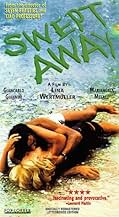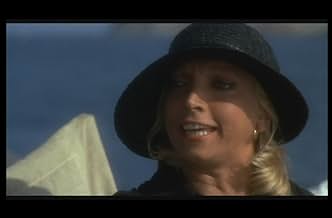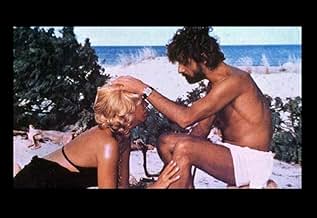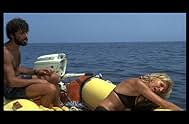CALIFICACIÓN DE IMDb
7.5/10
7.2 k
TU CALIFICACIÓN
Un viaje por el mar Mediterráneo se convierte en un viaje al descubrimiento de cómo los marcos sociales de ricos y pobres son delicados y temporales.Un viaje por el mar Mediterráneo se convierte en un viaje al descubrimiento de cómo los marcos sociales de ricos y pobres son delicados y temporales.Un viaje por el mar Mediterráneo se convierte en un viaje al descubrimiento de cómo los marcos sociales de ricos y pobres son delicados y temporales.
- Premios
- 4 premios ganados y 4 nominaciones en total
Opiniones destacadas
Sometimes, there is nothing better than just a simple tale, easy to follow, with breathtaking scenery. Wonderfully acted story that draws you in. Giancarlo Giannini is THE best Italian actor of his time. And as a bonus, with the explicit subtitles, you can learn how to curse in Italian! While the abusive male behaviour is not terribly pc these days, it reflects the culture of some European countries. All in all shows why foreign films are so different from American films. Viva la difference!
I feel that many of the comments for 'Swept Away...' slightly miss the point. Certainly, it is about politics. But Wertmuller is not taking sides between her communist & capitalist heros. She is examining what happens when they are removed from the society that defines their roles and their relationship.
Once the balance of power is reversed, they essentially change places. He becomes dominant (and often abusive). She becomes weak and submissive. The rough sex, etc. is all symbolic of how the poor are treated by the rich. And Wertmuller shows us that the 'working class hero' has no inherent nobility. Put in the position of power, he is every bit as cruel as his former oppressors. Once they return to society, the balance of power is once again reversed.
The message here is that there are no political heros and villains. Power is relative and arbitrary. And sadly, it is our nature to abuse it. The lesson is, perhaps, that we must rise above that base instinct and treat our fellow men with empathy and generosity. "We have met the enemy, and he is us."
Once the balance of power is reversed, they essentially change places. He becomes dominant (and often abusive). She becomes weak and submissive. The rough sex, etc. is all symbolic of how the poor are treated by the rich. And Wertmuller shows us that the 'working class hero' has no inherent nobility. Put in the position of power, he is every bit as cruel as his former oppressors. Once they return to society, the balance of power is once again reversed.
The message here is that there are no political heros and villains. Power is relative and arbitrary. And sadly, it is our nature to abuse it. The lesson is, perhaps, that we must rise above that base instinct and treat our fellow men with empathy and generosity. "We have met the enemy, and he is us."
A trip into the Mediterranean sea becomes a trip into the discovery of how society's frameworks of the rich and poor are delicate and temporary.
In his review in the Chicago Sun-Times, American film critic Roger Ebert gave the film four stars, his highest rating. Ebert wrote that the film "resists the director's most determined attempts to make it a fable about the bourgeoisie and the proletariat, and persists in being about a man and a woman. On that level, it's a great success." I'm on board with Ebert. I think this film was exceptional. Emotionally, it was raw, and I have to praise the performers and the director for the intensity. How you get a love story out of deep economic and political hatred, I don't know, but they pull it off. And despite the violence and abuse, there is something deeper here. Really a great film with something powerful to say.
In his review in the Chicago Sun-Times, American film critic Roger Ebert gave the film four stars, his highest rating. Ebert wrote that the film "resists the director's most determined attempts to make it a fable about the bourgeoisie and the proletariat, and persists in being about a man and a woman. On that level, it's a great success." I'm on board with Ebert. I think this film was exceptional. Emotionally, it was raw, and I have to praise the performers and the director for the intensity. How you get a love story out of deep economic and political hatred, I don't know, but they pull it off. And despite the violence and abuse, there is something deeper here. Really a great film with something powerful to say.
What marvelous Italian sensibility! Italians have to be muted for drama, but give them comedy and they soar, it's who they are, who we are in general down South and all over the Mediterranean - boisterous, frivolous, yelling past each other out of some need to stay afloat, lest the silence bogs us down.
The allegory is of course as obvious as the characters, a shrill rich wife and a grumbling sailor, a communist we're told, on board her yacht during a cruise get stranded in a deserted island. Of course the dynamics shift - we see how easy and quick it is for him to become a tyrant now that he has the upper hand, how degrading for her to be ordered about. But then sex enters the picture and that changes everything; she's beaten around, almost raped and comes to love the submission.
As thin as the politics may be, so much more subversive when it becomes sexual. Rape fantasies are common in men and women alike, no reason to hide, and nothing peculiar about it - sex is after all in a primal way about the swap of power. But here just as about the fantasy is about to be consummated, at the peak of sexual paroxysm, this is the moment the filmmaker chose to have the man pull back and be revealed a delusional fool - she must cherish him as her god and so on.
The question that looms, a deep deep one, is was it the island? Or is it civilization that obscures? Which of the two shows their true self? Eventually they bond as lovers, but that is based on everything else we've seen. Do the limits imposed by being seen and known in public lead into delusions of self? Or does uninhibited freedom? Was it true love or was it a simple desire that found no limits to run up against? Who's to make all these impositions of truth anyway?
And we have to counterpoint all this against the richness of how they hold themselves in each other's eyes, some of the most expressive eyes in film - it's perfectly cast anyway, but the eyeplay between the two is marvelous, starting from that moment they share on the deck one night.
So this is fascinating stuff, about limits of self, about a slippery passion and having no logical truth that can explain beyond it, the only thing it asks is that you don't be moral about it. I can only imagine it better in Pasolini's hands, this lover of textures and breezes of air.
The allegory is of course as obvious as the characters, a shrill rich wife and a grumbling sailor, a communist we're told, on board her yacht during a cruise get stranded in a deserted island. Of course the dynamics shift - we see how easy and quick it is for him to become a tyrant now that he has the upper hand, how degrading for her to be ordered about. But then sex enters the picture and that changes everything; she's beaten around, almost raped and comes to love the submission.
As thin as the politics may be, so much more subversive when it becomes sexual. Rape fantasies are common in men and women alike, no reason to hide, and nothing peculiar about it - sex is after all in a primal way about the swap of power. But here just as about the fantasy is about to be consummated, at the peak of sexual paroxysm, this is the moment the filmmaker chose to have the man pull back and be revealed a delusional fool - she must cherish him as her god and so on.
The question that looms, a deep deep one, is was it the island? Or is it civilization that obscures? Which of the two shows their true self? Eventually they bond as lovers, but that is based on everything else we've seen. Do the limits imposed by being seen and known in public lead into delusions of self? Or does uninhibited freedom? Was it true love or was it a simple desire that found no limits to run up against? Who's to make all these impositions of truth anyway?
And we have to counterpoint all this against the richness of how they hold themselves in each other's eyes, some of the most expressive eyes in film - it's perfectly cast anyway, but the eyeplay between the two is marvelous, starting from that moment they share on the deck one night.
So this is fascinating stuff, about limits of self, about a slippery passion and having no logical truth that can explain beyond it, the only thing it asks is that you don't be moral about it. I can only imagine it better in Pasolini's hands, this lover of textures and breezes of air.
I really loved this movie. I have to admit I only saw this because I heard of Madonna's remake and my love for the Goldie Hawn movie "Overboard", but...wow! Interesting, romantic, powerful, hard-to-watch, political, funny, sad, etc. This movie has it all. You can analyze this movie to death, but it will do it a disservice. Quite simply, it's about a bizarre romance that happens when two people who are total opposites, thus hating each other, are stranded on a remote island and must learn how to live together. By today's standards, this is a very un-P.C. movie: Male domination over a woman. However, it IS just a movie, not real life--don't let that put you off; and there are some scenes that are hard to take, but given the context of the characters, you might think to yourself--"is this deserved?" I think some parts are, and others--not at all. You might like this film if you liked Pedro Almodovar's "Atame! (Tie Me Up, Tie Me Down!)". This is a film you'll end up discussing with others after you've seen it. Also, I don't recommend viewing this around children or very impressionable teenagers.
¿Sabías que…?
- TriviaWas chosen by Premiere magazine as one of the "100 Movies That Shook the World" in the October 1998 issue. The list ranked the most "daring movies ever made."
- ErroresWhen the dinghy stalls out, Rafaella complains about not having paddles. Minutes later in the film, Rafaella and Gennarino both have paddles in their hands.
- Citas
Gennarino Carunchio: One bitch up there, and another down here, and my friend the sea turned traitor!
- ConexionesFeatured in Sola me ne vo... (2013)
Selecciones populares
Inicia sesión para calificar y agrega a la lista de videos para obtener recomendaciones personalizadas
- How long is Swept Away?Con tecnología de Alexa
Detalles
Taquilla
- Total en EE. UU. y Canadá
- USD 33,698
- Fin de semana de estreno en EE. UU. y Canadá
- USD 1,011
- 16 abr 2017
- Total a nivel mundial
- USD 33,698
Contribuir a esta página
Sugiere una edición o agrega el contenido que falta

Principales brechas de datos
What is the Spanish language plot outline for Travolti da un insolito destino nell'azzurro mare d'agosto (1974)?
Responda














